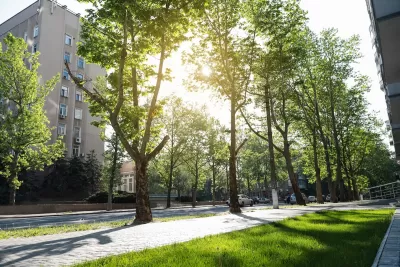Cal Poly, in partnership with Cal Fire, is leading the development of California’s new Strategic Plan for Urban Forestry, combining advanced data tools and interdisciplinary collaboration to expand tree canopy cover.

Cal Poly has been awarded a contract to develop California’s new Strategic Plan for Urban Forestry, in collaboration with Cal Fire and driven by Assembly Bill 2251. As reported by Emily Slater, this ambitious initiative aims to increase statewide tree canopy cover by 10% by 2035, addressing climate change, improving air quality, and fostering equity in green space access. The project, led by Cal Poly’s Urban Forest Ecosystems Institute (UFEI) and spearheaded by biological sciences professor Jenn Yost, leverages cutting-edge data and tools like SelecTree to guide urban forestry management. The plan focuses on expanding canopy cover in disadvantaged communities most affected by extreme heat and limited access to shade.
UFEI’s expertise in urban forestry, backed by advanced neural network-powered mapping techniques that have identified 40 million trees statewide, will inform policies and strategies to ensure equitable distribution of urban forest benefits. The strategic plan emphasizes resilience through biodiversity, actionable goals for cities, and stakeholder engagement to maximize community impact. According to UFEI director Matt Ritter, addressing California’s status as the most urbanized state with the lowest per capita canopy cover is critical to reversing environmental disparities and preparing for climate challenges.
This yearlong effort involves coordination with tribal nations, nonprofits, local governments, and tree professionals to create a comprehensive and inclusive plan. By June 2025, the final roadmap will be delivered to the state legislature, offering data-driven strategies to promote canopy growth and enhance urban forest resilience. Through interdisciplinary collaboration, Cal Poly is poised to deliver transformative solutions to improve urban ecosystems and foster thriving, equitable communities across California.
FULL STORY: Cal Poly to Lead Development of California’s New Urban Forestry Strategic Plan

Planetizen Federal Action Tracker
A weekly monitor of how Trump’s orders and actions are impacting planners and planning in America.

Congressman Proposes Bill to Rename DC Metro “Trump Train”
The Make Autorail Great Again Act would withhold federal funding to the system until the Washington Metropolitan Area Transit Authority (WMATA), rebrands as the Washington Metropolitan Authority for Greater Access (WMAGA).

The Simple Legislative Tool Transforming Vacant Downtowns
In California, Michigan and Georgia, an easy win is bringing dollars — and delight — back to city centers.

The States Losing Rural Delivery Rooms at an Alarming Pace
In some states, as few as 9% of rural hospitals still deliver babies. As a result, rising pre-term births, no adequate pre-term care and "harrowing" close calls are a growing reality.

The Small South Asian Republic Going all in on EVs
Thanks to one simple policy change less than five years ago, 65% of new cars in this Himalayan country are now electric.

DC Backpedals on Bike Lane Protection, Swaps Barriers for Paint
Citing aesthetic concerns, the city is removing the concrete barriers and flexposts that once separated Arizona Avenue cyclists from motor vehicles.
Urban Design for Planners 1: Software Tools
This six-course series explores essential urban design concepts using open source software and equips planners with the tools they need to participate fully in the urban design process.
Planning for Universal Design
Learn the tools for implementing Universal Design in planning regulations.
Smith Gee Studio
City of Charlotte
City of Camden Redevelopment Agency
City of Astoria
Transportation Research & Education Center (TREC) at Portland State University
US High Speed Rail Association
City of Camden Redevelopment Agency
Municipality of Princeton (NJ)





























